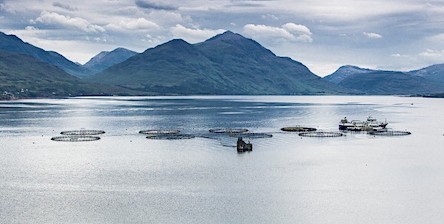Salmon Scotland, the body which represents the Scottish salmon industry, has raised fears that a “trade war” with the EU could have a devastating impact on Britain’s export market.
Scottish salmon is the UK’s biggest fresh food export, with sales of £372 million to EU countries last year – accounting for 61% of global Scottish salmon exports and supporting thousands of jobs in rural Scotland.
Ongoing reports suggest that UK Government ministers want to amend the Northern Ireland protocol, which has sparked concerns of retaliatory action by the EU.
Salmon Scotland Tavish Scott said: “As the political rhetoric ramps up, the wider interests of all exporters to continental Europe are not being considered.
“A trade war should be avoided at all costs.
“Like many sectors, our members have spent months addressing the challenges of Brexit, including the extra paperwork required.
“That hard work by Scottish farmers must not be jeopardised.
“As demand for our world-renowned Scottish salmon continues to soar, we urge the UK Government to navigate a way through this that doesn’t harm vital trade deals.”
Meanwhile, the Scottish Government’s Economy Secretary Kate Forbes has warned that the UK Government must not introduce legislation which breaks international law, but instead find sustainable solutions to help ease trade between the UK and EU countries.
In a letter to the UK Chancellor of the Exchequer, Forbes outlines concerns that the UK approach to the Northern Ireland Protocol talks is bringing threats of a trade war.
She also said that the Trade and Cooperation Agreement is failing to deliver for many sectors, including food and drink businesses in Scotland.
The letter states: “I am deeply concerned about ongoing threats by the UK Government to introduce legislation to breach international law.
“The food and drink sector in Scotland and the UK has borne the brunt of the hard Brexit pursued by the UK Government, particularly through the loss of freedom of movement and free trade.
“A trade war could lead to further delays to exports, including in sectors like seafood where there is a premium on freshness, further bureaucracy and barriers and potentially crippling tariffs.
“It is increasingly clear that the Trade and Cooperation Agreement is failing to deliver for many businesses, and that the UK Government’s approach to the Northern Ireland Protocol talks is exacerbating matters.
“This has serious implications for key parts of Scotland’s food and drink sector – such as the ongoing impasse over the export of seed potatoes – while also impacting other crucial areas like the UK’s legal association to the vital Horizon Europe research programme.
“The Devolved Governments have direct interests at stake in the Protocol, particularly in trade and border control, yet despite repeated requests the UK Government has shown no willingness to engage on these issues and we are excluded from discussions.”
Scotland has over 17,000 food and drink businesses, which employ around 119,000 people, many in remote and economically fragile rural and island communities.
